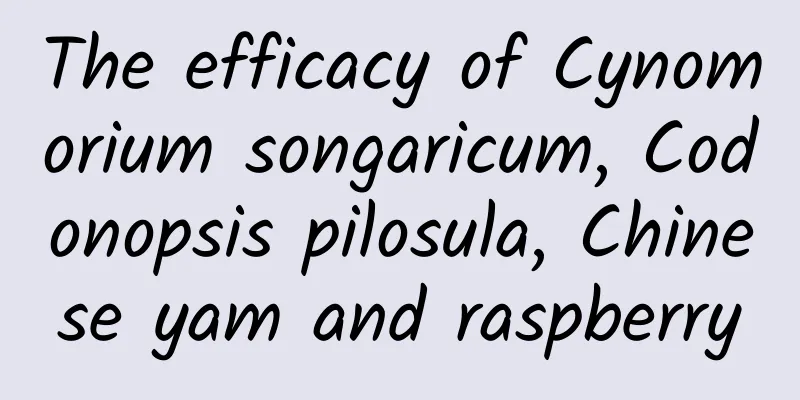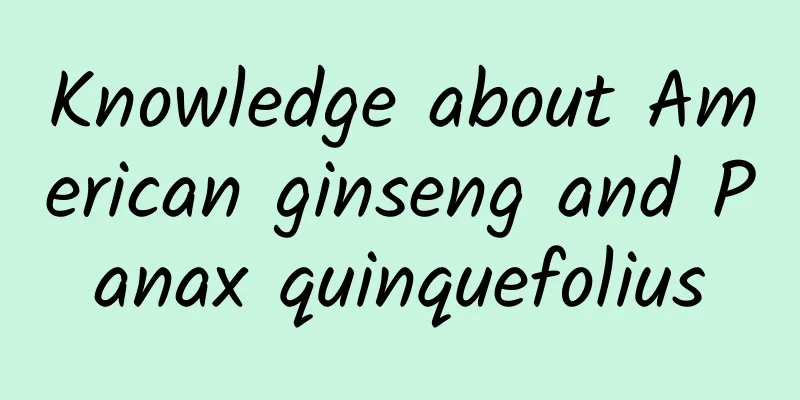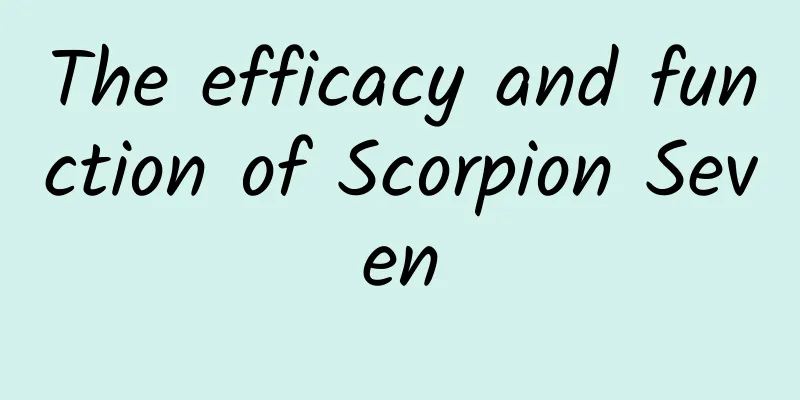The efficacy of Cynomorium songaricum, Codonopsis pilosula, Chinese yam and raspberry

|
Do you know what is Cynomorium songaricum? What is Chinese yam? What is Codonopsis pilosula? And what is raspberry? People who don't know Chinese medicine generally don't know what these medicines are, what diseases they are used to treat, and what health effects they are used for. In this way, we can better get the various effects of Cynomorium songaricum, Codonopsis pilosula, Chinese yam and raspberry. The value of each medicine is different. So what are the effects of Cynomorium songaricum, Codonopsis pilosula, Chinese yam and raspberry? Cynomorium songaricum is the most commonly used herb for kidney tonification. It can calm the liver and tonify the kidney, replenish essence and blood, moisten the intestines and promote bowel movements. It can treat infertility caused by insufficient qi and blood, strengthen muscles and bones, and supplement calcium. It has great benefits for human body functions; enhances immune function; scavenges free radicals; resists platelet aggregation; has glucocorticoid-like effects; and supplements vitamins and minerals. The latest scientific experiments have proved that Cynomorium songaricum also has the effects of preventing cancer, anti-virus and anti-aging. It is suitable for people with low immunity and who are susceptible to diseases; young and middle-aged people who overdraw their health due to overwork; and patients with various chronic diseases such as frequent urination, constipation, insomnia, hair loss, asthma, impotence and premature ejaculation. Effects of Codonopsis pilosula: The main effect of Codonopsis pilosula is to replenish qi. It is most suitable for people who usually feel tired, weak and lack of energy. People with weak lung qi who have a deep voice, feel short of breath, and become breathless with the slightest activity. People who mainly suffer from spleen and stomach qi deficiency, weakness in the limbs, loss of appetite, and loose stools should also use Codonopsis pilosula. Dang Shen is often used in combination with Atractylodes macrocephala, Poria cocos, and roasted licorice. This is the famous prescription Sijunzi Decoction for replenishing Qi and strengthening the spleen. For those with weak lung and spleen qi, it is advisable to use a combination of Codonopsis pilosula, Astragalus membranaceus, Atractylodes macrocephala, Poria cocos, tangerine peel, Angelica sinensis, Cimicifuga heracleifolia, Bupleurum chinense, roasted licorice, ginger and jujube. This is the famous Buzhong Yiqi Decoction. Effects of yam: Replenishing Qi and Blood Blood deficiency should be treated by nourishing blood. Foods that are good at replenishing blood include pork liver, tendon, cuttlefish, longan meat, black soybeans, black sesame, etc. Chinese medicines that are strong at replenishing blood include donkey-hide gelatin, Rehmannia root, Angelica sinensis, Polygonum multiflorum, white peony, Millettia reticulata, mulberry, etc. Yam replenishes qi, strengthens the spleen, and nourishes the stomach. When used in combination with blood-enriching foods and medicines, it can enhance the blood-enriching effect. Benefits of raspberries: 1. Nutritional content of raspberries Raspberries are rich in organic acids, sugars and a small amount of vitamin C. The fruit also contains triterpenes, raspberry acid, ellagic acid and β-sitosterol. 2. The efficacy and function of raspberry Many ancient books record the efficacy and effects of raspberry. For example, "Compendium of Materia Medica" says: "Raspberry is sweet and mild and enters the kidney. It can raise yang and treat impotence, consolidate essence and control urination, strengthen the kidney without the bias of dryness and heat, consolidate essence without the harm of astringency, and is a product of gold and jade." "Compendium of Materia Medica" says: "Raspberry is mainly used to invigorate qi, which means to invigorate essence and qi. The kidney stores essence and absorbs qi. When the essence and qi are sufficient, the body will be light and the hair will not turn white. Su Gong mainly replenishes deficiency and continues deficiency, strengthens yin and builds yang, moisturizes the skin, and calms the internal organs. Zhen Quan treats male kidney essence deficiency and impotence, and women can have children after eating it. Daming mainly calms the five internal organs, improves complexion, nourishes essence and qi, grows hair, and strengthens will. They all take the meaning of invigorating the kidney and adding essence, and being sweet and sour and astringent." "Compendium of Materia Medica" says: "Raspberry is used in prescription books to treat symptoms such as fatigue, fatigue, or to invigorate the kidney's original yang, or to invigorate the kidney's yin qi, or to nourish essence and blood. It can help each other according to its appropriate main purpose." And so on. In the above content, we introduced the various medicinal effects, functions and values of yam, Cynomorium songaricum, Codonopsis pilosula and raspberry. If you know and understand them clearly, you can choose these Chinese medicines more reasonably to nourish your body and get good therapeutic effects when you have any abnormal phenomena. However, the dosage should not be too much. |
<<: What are the storage methods of Cynomorium songaricum
>>: Can Astragalus really be consumed for a long time?
Recommend
Is it good to drink wolfberry soaked water every day?
When drinking wolfberry water, many people do not...
Gartner: Only 9% of U.S. consumers plan to increase spending during the 2023 holiday shopping season
According to a Gartner survey, only 9% of consume...
I pull bird nets, catch birds, and shoot them, but I am a bird protector
Editor’s Note: After the last "Meeting Birds...
Is it okay to eat this kind of "fly"? !
Recently, many fruits and vegetables have come on...
The efficacy and function of water eggplant
Water eggplant and winter melon is a common Chine...
The efficacy and function of small red willow root
The root of the small red willow is a common Chin...
Why do we see colors? Do different people see colors the same?
The world is so fascinating in large part because...
30 years of research at Harvard University: 2 servings of fruit + 3 servings of vegetables a day is the healthiest!
Fruits and vegetables, as an important part of ou...
Do you sneeze when you see the sun? It's your genes that are causing the problem
Sneezing is a normal physiological phenomenon, bu...
Peking Union Medical College doctor said: Five things you should pay attention to during the peak period of Norovirus infection →
Norovirus can cause acute infectious diarrhea, an...
Equisetum arvense[picture]'s efficacy and function
Equisetum [picture] is rich in nutritional value ...
What are the contraindications and effects of Millettia reticulata
Do you know what Millettia reticulata is? Many pe...
The efficacy and function of arrow shaft wind
Arrow shaft wind is something that many people ar...









